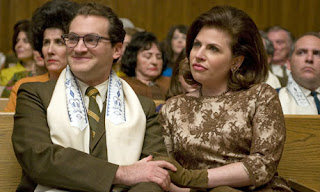
Warning: May contain some brief, spoiler-ish details. Proceed with caution.
After I first saw “A Serious Man,” I knew I liked it. I mean, how could I not like a film by the Coen Brothers?
However, there were a few things still bothering me. Well, mainly, it was that ending. Abrupt endings can be annoying, but I never hate them. All they involve is mulling over, and extra viewings. This was the case for “A History of Violence” and “No Country for Old Men.” It was also the case for “A Serious Man.”
But let me backtrack, so you can see the ending for yourself. I’m going to backtrack all the way to the beginning, to the mystery of the dybbuk. The Coen Brothers have repeatedly said that this story has no meaning, but I believe that there is something in there. There are three possible theories to this scene:
1) The couple were Larry’s ancestors. Stabbing the dybbuk unleashed a centuries long family curse.
2) The man was not really a dybbuk. His unfortunate death mirrors Larry’s struggle of how bad things always seem to happen to those who just try and commit mitzvahs.
3) It’s both. Or neither.
It could be any of those answers. But the more I think about it, the more I believe it is the last one. That’s the one that breaks the lock, and provides that any answer be correct. In the end, the dybbuk walks out into the snow. The Coen Brothers never show us whether or not he died or just kept on into the night, getting ready to haunt more unsuspecting citizens. What this scene truly does is act as a mini movie in preparing us on what is to come. “A Serious Man” will not be like the typical film that provides you with answers. Here’s one where you’ll have to come up with the answers on your own. And it won’t be easy.
A technique the Coen Brothers use constantly throughout their films is repetition. One line repeated in this film is Larry’s insistence, “I haven’t done anything!” And this here, is the point of the film. Why is Larry suffering? True, he hasn’t done anything wrong, but he hasn’t done anything right.
One of the many things I got out of the film a second time around is just how deeply funny it is. The humor doesn’t always lie in one-liners, it lies mainly within the situations. There are many instances where you shouldn’t be laughing, but you do anyways. Will you feel bad for laughing at some of Larry’s ridiculous misfortunes? Then again, the film does tell us in the very first shot to take every minute with “utmost simplicity.”
In my first review, I gave praise to the film’s three leading men, Michael Stuhlbarg, Richard Kind, and Fred Melamed, but not as much praise as they deserve. While Kind was cast as the annoying relative he always plays, he manages to still make him as atypical as possible. Meanwhile, Melamed seems like a lock for best supporting actor as Sy Ableman. He is (if I’m reading the film right) the serious man of the title. And he plays Sy that way, portraying him with utmost scrutiny. He commands every shot he is in, taking it over, moving around characters by his own wishes and just carrying this feeling that he knows everything.
Then of course, there’s the other Oscar lock, of Stuhlbarg as Larry Gopnick. This is Stuhlbarg’s first big leading role, but he takes it like a pro. In the scene where Larry’s wife discusses a divorce, his pitch goes up to a high, whiny voice; giving Larry an almost lovable childlike ignorance.
The Coen Brothers are famous for emphasizing their characters’ quirks. Stuhlbarg basically does that for them, as he gives Larry a sort of chicken walk, especially in the scene where he waddles across his look, getting a peak at the forbidden temptation that lies just over a small white picket fence.
While that serious man in the title could refer to either Sy or Larry, there is yet another important (soon to be) man in the mix: Danny Gopnick (Aaron Wolff). He lives a life opposite of his father, only caring about smoking joints and watching “F-Troop” rather than trying to be a mature, serious man. However, he, like every character, eventually faces just consequences for their poor actions.
A large controversy I’ve discussed with many people about this film is what kind of audience it was meant for. The idea that only a Jew could appreciate it is one I am beginning to find quite unfair. Just because I wasn’t raised Catholic, does that mean I can’t be stunned by the christening scene in “The Godfather?” Just because I’m not Italian, does that not mean I can’t be entertained by the wedding in “Goodfellas?” While maybe only those who were born Jewish will understand the anxiety of preparing to have a Bar Mitzvah, the Coen Brothers opened up a door to the Jewish culture. They are inviting you to stay and look around.
Now, there’s one point from my last review I’d like to correct. In my previous review, I seemed to stick to the theory that Larry’s story was a reflection of the story of Job. Well, it’s only half that. The other half is the possibility that Larry’s story reflects existentialism, rather than the existence of God. Larry’s miseries could be a test from God. Or they could just simply be life’s plan for him, and there’s nothing he can do about it (
this scene reflects this idea).
Also in the mix, you could see Larry as a 1960s Jewish version of Hamlet; a man spending too much time overthinking life and trying to avoid a situation that simply cannot be avoided. He could even be a figure straight out of a Kafka* story: a good man who is so overburdened by a world that demands too much responsibility out of him.
It’s simply possible that “A Serious Man” is every single one of these ideas. Or none of them. This makes the film a sort of “choose your own adventure” like story but this time, you have to choose your own theme. The Coen Brothers have thus constructed the rare film that’s a totally different experience to each and every member. Yep, the way a film should be.
But maybe the Coen Brothers, who are the absolute masters of trickery, are just leading us into a giant trap. They awaited as critics and audience members alike overanalyzed every aspect of the film to death when they were missing the film’s real point: the danger of overanalysis. In the film, we learn in the end that the mystery of the goy’s teeth is solved once the dentist forgets about it. Perhaps Larry’s problems would have been nothing to him if he just, took a deep breath and forgot about them for a while.
So for now, I’m not going to fall for the trick. I leave the rest of the interpretations up to you.
*Tip for Aspiring Writers: A Kafka namedrop always makes you look smarter.
For further reference, here are a few great articles about the film:
I know I’ve written a lot here, but I still didn’t even get to touch on Larry’s neighbors, physics, respecting privacy, the wisdom of youth, and the film’s representation of connections within the Jewish community. Oh well, it doesn’t look like this is the last time you’ll be hearing about “A Serious Man.” Until then, I want you all to take a few minutes and enjoy one of the most meaningful parts of the film: the power of “Somebody to Love”:







